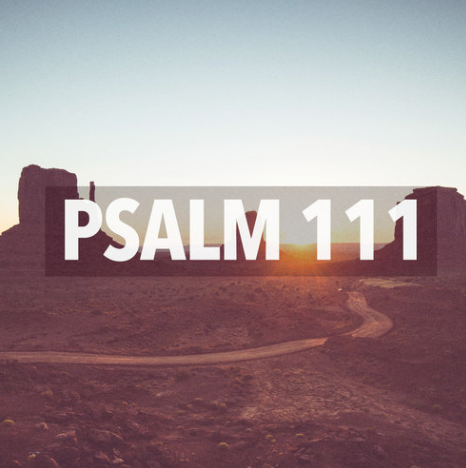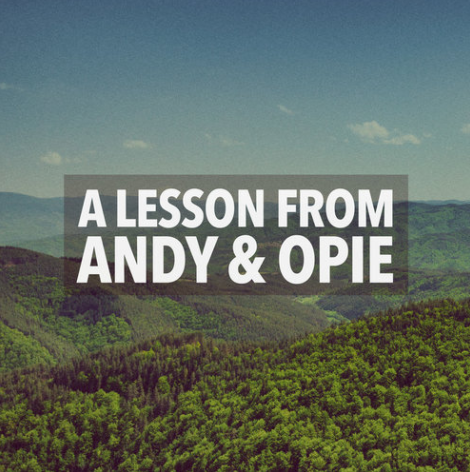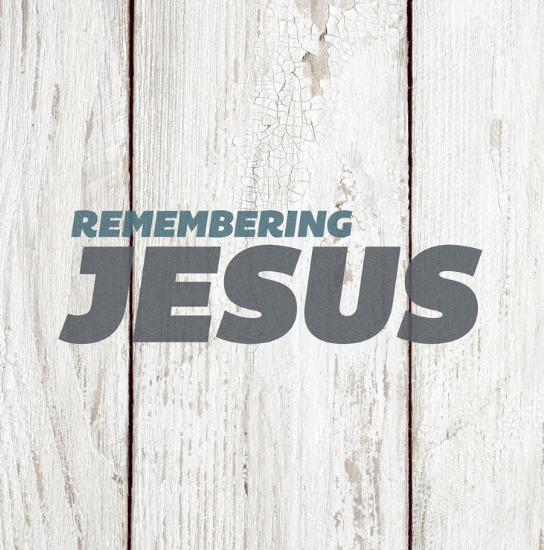I Stopped Reading the Bible
Ok…first things first: I haven’t stopped reading the Bible. Just wanted to clear that up right now. It would be pretty disheartening if a pastor, your pastor or any pastor, stopped spending time in the very thing that should be the greatest influence in their life. So maybe now is a good time to complete that sentence…
I stopped reading the Bible in a year, every year.
Now that we’ve settled that, let me ask you a question: What are some things you know you need to do, it’s just hard to actually do it? Exercising…dieting…organizing that room…
Go ahead…take a few moments to write out a short list.
Any surprises? If you were to make this list in a month…or if you had made this list three months ago…would there be any repeat offenders?
The thing with lists like these is they have the tendency to make us feel guilty or unaccomplished or lazy. These feelings especially come to life when we start comparing ourselves to what we see others doing (or at least posting about on social media…I mean, if they posted it, it has to be true, right??). We’ve all experienced it and we’ve all fallen prey to the “Comparison Game.” It even happens to us in our spiritual lives, doesn’t it?
Ok…one more list…last one, I promise. Write down a few things that answer this question: What things do you do out of a feeling of obligation rather than genuine desire?
If you were to think of this from strictly a spiritual perspective, I think for some of us, reading the Bible might fall into this category. As Christians, one of the things we know we need to do but often have a difficult time carrying out is consistently getting into the Bible…spending time in God’s Word. The research shows us that this continues to be an ongoing dilemma for believers. Surveys have been done by Pew Research Center, Lifeway Research, Barna, and more showing that when it comes to spending consistent time in Scripture, we leave a lot to be desired. Reminder—these surveys are targeted to professed believers…people who say they are Christ-followers.
Now, I say that reading the Bible may fall into the obligatory-actions category for some of us because, as the research shows, many proclaimed Christ-followers admit to rarely, if ever, consistently reading the Bible for personal spiritual growth. Enter my ceasing to read the Bible…
If we’ve spent any amount of time in church, we have most likely heard it preached the importance of daily spending time with God. Call it personal study time, Jesus-, devotional-, quiet time, or any of the myriad of other names…whatever you call it, most of us don’t do it. But for that person who says, “I want to read the Bible more, I just don’t know where to start…” it will inevitably come to someone suggesting that person follow a reading plan. Through the ever-increasing resources available to us today, the number of reading plans out there is constantly growing. A reading plan is a scheduled approach to reading Scripture. They can take you through a book of the Bible or help you make your way through the Psalms or learn more about what Scripture says about a certain topic. These plans span from a single week, to 30 days, to a year.
Let me be clear: There is absolutely nothing wrong with using a reading plan to get into Scripture! I am not against reading plans at all. In fact, there will be several plans linked at the end of this article to help you get started, if that’s what you need. I, a pastor of 15 years, have used countless reading plans throughout my life to keep working my way through Scripture. I’ve read the entire Bible starting in Genesis 1 and going through Revelation 22. I’ve gone through the Bible chronologically, both in the order that things happened and the order in which it was written. Some plans paired up Old Testament passages with New Testament ones. Other plans included the Psalms and Proverbs every day. All this to say, I have nothing against Bible reading plans.
Where the rub came in was the moment when I realized that my participation in the reading of God’s Word had become more about checking off the day’s scheduled reading and not personally engaging in relationship with the Creator God who wrote it. You ever had a moment like that? A moment when you just stopped and asked, “Why am I doing this?” In his letter to the church in Colossae, the Apostle Paul wrote, “And whatever you do, in word or deed, do everything in the name of the Lord Jesus” and “Whatever you do, work heartily, as for the Lord and not for men, knowing that from the Lord you will receive the inheritance as your reward. You are serving the Lord Christ.” (Colossians 3:17, 23-24 [ESV])
We have these reality check moments more often than we think, or at least we should. Those moments when we stop, reflect, and really think about our motives behind doing something. Am I working out because I want to be in better shape or because I want to impress someone else? Do you work hard at your job because you want to perform well or because you want to be noticed and acknowledged and maybe rewarded? The same can be applied to our walk with the Lord. Do we post all the verses, memorize and quote the Scriptures, say all the right things because we want to honor God and point others to Him or do we want people to think highly of us?
For me, I had turned what should be a soul-nourishing experience into a checklist object; something to mark off like when I get an item in the grocery store off my list. I found a sinful pride in saying that I had read through the whole Bible so many times. Doesn’t mean I loved God any less. Doesn’t mean I didn’t care about God’s Word. But I was absolutely not fully internalizing what I was reading. A change was needed. I needed a fresh approach, a rejuvenation of the investment I was making into my soul. Not because I deserve more from the time I “sacrificed” in reading and prayer, but because God deserves my very best…and that’s not what He was getting from me.
Billy Graham, the world renown evangelist, said the following:
The theologian, priest, and Augustinian monk Martin Luther said of the Bible:
And, lastly, Augustine of Hippo:
Like many of you (I assume…and yes, I know what they say about assuming), I find that once I get into the rhythm of my day, it’s hard to slow down. That’s why, for me, spending time in Word and prayer has to happen at the very beginning of my day. I have been in this habit for over 15 years now that my Bible reading time happens in the morning before anything else. My normal is to wake up at 5:30am so that I have the time to spend uninterrupted. Do not read this as, “Oooo…so spiritual” or “Well, he’s a pastor, so…”
I hate mornings…don’t like ‘em…never have. Even when I wake up early to get on the boat to go fishing…still don’t like mornings. I’m a big supporter of Proverbs 27:14 that says, “A loud and cheerful greeting early in the morning will be taken as a curse!”
But God deserves my mornings. Why? I know that my boys will be up soon and then it’s game on! If I am not intentional in getting up early, slowing down to spend time with God will not happen. I have to make it a priority. And if you claim to be a follower of Christ, it needs to be a priority for you, too. I don’t say that to incite guilt or sound like I know what’s best for everybody. I say that because God says it. He gives us this directive in Matthew 6:33, Psalm 119:105, Mark 14:51-52, and John 15:1-5. (Actually only 3 of those passages are on topic…you can figure out which isn’t…look at that…we’re already getting into Scripture.)
So if I stopped following a reading plan, what do I do? How do I approach the Bible now? Right now, I am working my way through a book or two at a time. Each day is different. One day may go through three chapters while the next, maybe just one. There is no rush…only a hope for increased attentiveness and contemplation.
I recently came across an approach to reading Scripture that I’m loving (but need to get better at implementing each day). This method is from Leroy Eims and it looks like this:
Every time you read Scripture, ask yourself the following…
- What does this passage say to me?
- Where am I falling short?
- Give specific examples.
- What am I going to do about it?
(The Lost Art of Disciple Making, Leroy Eims, p78)
So here’s my challenge to you:
- Schedule your time with God…a time when you can give Him full attention and focus. We schedule almost every part and aspect of our lives…why not schedule our time with God? Now we’re not talking about 3 hours of silence and solitude and meditating. If you can give God 10 fully-focused, uninterrupted minutes…that’s awesome!!!
- Examine what you currently prioritize, especially first thing in the morning. Is your phone, email, etc. more important to get to than the God who is eagerly awaiting your company?
- Just start reading…anything from any book in the Bible.
Don’t get discouraged. Don’t give up. Jump back in. You can do this. You should do this. God is there and is ready to spend time with you!
Value the Life of Your Mind
Ian Wooldridge – March 25, 2020
A guitar-playing poet from the 60’s once sang, The times, they are a-changin’.1
Feels about right, doesn’t it?
With COVID-19 changing life as we know it, and with that the onset of widespread panic, anxiety, stress, and fear, we’ve entered into unprecedented territory. We’ve been forced to adjust to a new normal.
And it doesn’t help that we already live in what Edwin Friedman calls a culture of “reactivity,” in which we humans tend to anxiously live our lives in a reactionary state, as opposed to a calm, “non-anxious” state. 2 The 24/7 news cycle only makes this worse. We see a headline, a tweet, another notification, and we react. We become anxious. We get mad.
The cycle continues.
But as followers of Jesus, we can change this narrative by becoming a “non-anxious” presence in an age of reaction and anxiety, as we continually take on His character as our own.
Over the course of the next several weeks, I’ll be heading up a blog-post series inspired by this simple question: How can we let this season of COVID-19 form us more into the likeness of Jesus? We’ll explore that question by looking at different practices for a Christ-centered life — practices that will help us stay grounded and centered, not just in this season, but beyond as well. You’re invited to come along. Each week, a new post, a new practice.
With that, here we go. First, a couple questions for you:
All legitimate, all valid. But the reality is, what we give our attention to most has a profound impact on our emotional and spiritual well-being — ultimately, over time, on the kinds of people that we become. Science proves this, but keeping vigilance over your heart and mind and the kind of life that comes as a result is an idea that the book of Proverbs was onto a long time ago.3
Now, check out what David says in Psalm 16: “I keep my eyes always on the Lord. With Him at my right hand, I will not be shaken.” 4
Notice what he doesn’t say:
“I keep my eyes glued on the latest headlines… therefore I will not be shaken.”
“I stay up-to-date on what other people may be thinking or saying or commenting or ranting about… therefore I will not be shaken.”
David doesn’t say any of that. Instead, his life is characterized by a simple pursuit: “keeping his eyes always on the Lord.” Another translation says, “I have set the Lord always before me.”5 He’s after one thing: keeping the Lord and His presence in front of Him. As a result, he knows and is experiencing the life that “will not be shaken,” no matter the circumstance.
We can know the same.
So, as inspired by Psalm 16, here’s a practice that I’ve found to be game-changing; not just in tough seasons, but just in my life with Jesus. May it help you stay grounded and centered during COVID-19 and beyond — to be able to say with David, “I will not be shaken.”
The Practice: Value the Life of Your Mind
Worldwide, the average amount of time users spend on social media is about two and a half hours per day. 6 The average amount of time adults in the US alone watch TV is about four and a half hours per day. 7
2.5 hours of social media, 4.5 hours of TV. Whoa.
I share this because these numbers could easily go up in such a time as this. With social distancing leading to much isolation, “the screen” beckons and calls with much intensity. Of course, some of this will be necessary and helpful, and there’s nothing inherently bad about an app, social media, or TV. I’m not saying that at all. But these numbers raise some very compelling questions for me:
Now, Scripture has nothing to say about our digital habits. It has nothing to say about TV, how often we should check our news feed and social media, or what our “screen time” data should look like. But it does place an extremely high value on the life of our minds and imaginations. 8
Here’s just a sampler:
“Set your minds on things above, not on earthly things.” 10
“I’d say you’ll do best by filling your minds and meditating on things true, noble, reputable, authentic, compelling, gracious—the best, not the worst; the beautiful, not the ugly; things to praise, not things to curse.” 11
“For to set the mind on the flesh is death, but to set the mind on the Spirit is life and peace.” 12
“You will keep in perfect peace all who trust in you, all whose thoughts are fixed on you!” 13
Don’t get me wrong: I’m not saying you shouldn’t stay informed on issues that matter, or to ditch social media and live under a rock. Use it to check-in with people; especially now, stay engaged with what your church is doing online; post encouragement — yes to all of that! Just don’t live on it. Remember, it’s a tool: we don’t need it all the time.
I think this matters because author and researcher Jean M. Twenge reports that, “heavy internet users (vs. light users) are twice as likely to be unhappy… Overall, activities related to smartphones and digital media are linked to less happiness, and those not involving technology are linked to more happiness.” 14
I’m convinced a lot of this is because it’s through the portal-into-the-world that is “the screen” that “The loud, boisterous noises of the world make us deaf to the soft, gentle, and loving voice of God,” as Henri Nouwen writes. 15
And I’d add hinder our attention on God’s presence in the moment-by-moment reality of our lives.
Again, because we’re going to be finding ourselves separated a lot more than usual going forward, we can easily find ourselves glued to “the screen.” I’m not saying to abandon it all. I’m just acknowledging that there should be a healthy give and take; that we’d be wise to set some boundaries right now. It’s tricky, because we want — and even need — to stay connected to each other in this season; but on the flip side, when we’re not intentionally connecting with people, we can get sucked into the insatiable hole that is the internet, and with it, lots of noise that isn’t exactly helpful; noise that doesn’t exactly lead to joy or peace.
Especially when we read the statistic that 90% of us check our phones for news, social media updates, or texts Right. After. Waking. Up. 16 So, a great place to start here is to consider a current habit: what you do first thing when you wake up.
One of the most revolutionary (and that word is an understatement) changes that my wife and I have made in our discipleship to Jesus was to go to Walmart and buy these cheap, little analog alarm clocks, and to get our cell-phones out of the bedroom. With this, we have a pretty sweet rule in our home called “hour before, hour after” — we put our cell-phones in a dedicated “phone box” at least one hour before we go to sleep, and we don’t get them out of the “phone box” until at least one hour after we’ve been awake. Instead of checking phones first thing in the morning, we each begin our days with silence and solitude, in prayer, meditation upon God’s Word and His love, and in enjoying friendship with Jesus. It’s been nothing short of life-giving.
Now, before you think, “Um…. No. Y’all are weird, and that isn’t for me…”
Fair. We are weird.
I’m not prescribing this, per se. But I’d invite you to try something out this season: instead of checking or watching a screen first thing upon waking, pray and fill your mind with Scripture. Say a simple prayer, something like, “God, thank You for this new day. Help me to see it as You do, to go about it as You would, and please fill me with Your love, joy, and peace” and open up to a Psalm, and read it aloud slowly. Psalm 1, Psalm 8, Psalm 23, Psalm 121, or Psalm 139 are great places to start with this little exercise. Then, pick something that stood out to you from the reading, and ask God why it stood out to you. Nothing crazy. You can do all of that in 5 minutes. As with all Spiritual practices, start as you can, not as you can’t; where you are, not where you think you should be.
Here’s all I’m saying:
Instead, before any of that, let prayer and Scripture nourish your heart and mind as you meet each new day, and build your day on unhurried time spent alone with God in the quiet, enjoying His presence and gazing on His beauty. 17
Could we think of a better start to our days than that?!
You may say at this point, “well, my phone is my alarm clock.” That’s ok. You can get creative. Or, don’t do any of this — that’s ok, too; none of this is legalistic. But, if you really want to get crazy, maybe consider the switch, and try it out. It’s all invitational. I’d bet analog alarm clocks aren’t sold out right now.
Ok. Let’s end here. There’s this crazy moment in 2 Corinthians where Paul writes, “So all of us… can see and reflect the glory of the Lord. And the Lord—who is the Spirit—makes us more and more like him as we are changed into his glorious image. 18
We put Jesus before our eyes more, we become like Him more. Glory in, glory out.
Followers of Jesus, we get a unique opportunity to carry His likeness right smack in the middle of a world that will be carrying reaction, stress, anxiety, and fear in the days ahead.
All we have to do is just look at Him.
NOTES:
- That would be Bob Dylan, “The Times They Are A-Changin’,” 1964.
- Edwin H Friedman, A Failure of Nerve: Leadership in the Age of the Quick Fix (New York: Seabury, 1997). His overall premise is that we must become people with a “non-anxious” presence, right in the middle of a culture that’s quite the opposite.
- See Proverbs 4:23
- Psalm 16:8, NIV.
- This is out of the ESV translation.
- Aleksandar S., “How Much Time Do People Spend On Social Media…?,” Tech Jury, March 8, 2019, techjury.net/blog/time-spent-on-social-media/#gref
- Felix Richter, “The Generation Gap in TV Consumption,” August 19, 2019, www.statista.com/chart/15224/daily-tv-consumption-by-us-adults/
- Since you have time to read now, check out anything by Dallas Willard to explore this idea further; but especially his book Renovation of the Heart: Putting on the Character of Christ
(Colorado Springs: NavPress, 2002). But, I’m warning you — hold on to your socks. - Romans 12:2, NIV.
- Colossians 3:2, NIV.
- Philippians 4:8, MSG.
- Romans 8:6, ESV.
- Isaiah 26:3, NLT.
- Twenge, J. M. (2019). The sad state of happiness in the United States and the role of digital media (World Happiness Report). Retrieved from https://worldhappiness.report/ed/2019/the-sad-state-of-happiness-in-the-united-states-and-the-role-of-digital-media/.
- Henri Nouwen, In the Name of Jesus: Reflections on Christian Leadership (New York: Crossroad, 1989). Nouwen is so good at writing about the prayer-filled life, and what it can look like.
- Mary Gorges, “90 Percent of Young People Wake Up with Their Smartphones,” Ragan, December 21, 2012, www.ragan.com/90-percent-of-young-people-wake-up-with-their-smartphones.
- See Psalm 27:4 — one of my life verses right here.
- 2 Corinthians 3:18, NLT, emphasis mine.

Supernatural

What is the hardest thing in the Bible for you to believe? I am not saying you don’t believe it, just that it’s difficult for you. Seriously, take a second and think of what that would be. Ok, got it? Good, now let’s go on a journey together. I am going to take a stab at what that could be for you. I recently asked my Life Group what that would be and I heard a pretty consistent answers:
1. Jonah and the Whale (Jonah 1-4)
2. Noah’s Ark (Genesis 6-9)
3. Balaam’s Talking Donkey (Numbers 22:21-39)
4. People Rising from the Dead (Matt 27:52)
5. Jesus Loving a Sinner like Me (John 3:16)
Honorable mentions include casting out demon’s, talking bush, parting of the Red Sea etc.
Maybe you had a different one in mind. But no matter, I think we can all agree these are extraordinary claims. You might even say; these are difficult to believe. So now that I’ve got your brain working in overdrive, think about this: What do these all have in common?
One thing they have in common is the term super-natural. Now I know that’s not a term people like to use these days. In fact, most people live like only the natural world exists. I once even heard an atheist claim they only believe what they can see, taste, smell, touch, or hear. Essentially, they claim if it can’t be tested in a laboratory, then it’s not really true. Now as Christians in America, we probably wouldn’t say that. But deep down, is that why we struggle to believe every recording in the Bible is true?
I have seen hundreds of articles trying to explain how a Sperm Whale could feasibly eat Jonah, how Noah’s Ark could have been big enough, how the Red Sea could have parted in a drought and on and on and on. But why? Why do super-natural claims need to be explained naturally, when what is natural was created super-naturally? (Read that tongue twister again.)
Genesis 1:1
In the beginning God created the heavens and the earth.
God (Super-Natural) created the heavens and the Earth (Natural). If you believe this verse is true, then everything that was ever written from this verse onward is not only possible but probable. This verse just claimed that a Timeless, Spaceless, Immaterial, Personal, all Powerful and Super-Natural Being spoke all space, matter, and time into existence. And yet you are questioning how you can make space, matter, and time make since? Do you really believe Genesis 1:1?
I don’t know what doubts have been creeping into your head lately. Can God truly forgive me? Can God truly change me? Save me? Love me? Heal me or my loved one? Maybe, you have questioned stories in the Bible over and over again. But we all need to be reminded as we look around our “natural” world that there is no greater miracle, no greater super-natural “proof,” then the fact that everything that is “natural” was made by the “super-natural.”
So my challenge to you is this, why doubt God? Why doubt the Bible? Why doubt what God can do? He created “natural” and He can create a new you from the inside out. He is the Creator so why are you surprised when He gets creative?
Super-natural claims do not need to be explained naturally, when what is natural was created super-naturally. Press on in the reality of God and know that ”His invisible attributes, namely, His eternal power and divine nature, have been clearly perceived, ever since the creation of the world, in the things that have been made. So they are without excuse.” Romans 1:20

Psalm 111

The book of Psalms continues to influence my understanding of God and how to express my worship. From the musical element of a Psalm being sung to a meditation, it offers guidance and form to both the personal and corporate expressions of worship. As an instrumentalist, I am particularly fond of the last several chapters in which the expressions of worship are given voice through a wide range of musical instruments. In this blog, I’d simply like to break down some verses from Psalm 111 as an exercise in adapting and expanding a text into my own words. This is a way to personalize the text and further experience the richness and depth the Psalm. I encourage you to do the same in the context of maybe your personal devotion time or any other context in which you are seeking to mediate and ponder God’s Word.
PSALM 111
1Praise the Lord. I will extol the Lord with all my heart in the council of the upright and in the assembly.
The Lord is worthy of exaltation and admiration. To extol is to do these things. This happens in both a personal and corporate context. As we exalt God in our heart it spills out into the external behavior and actions of the worshipper as he gathers with others who do the same. This is the power of the assembly as the praise and exaltation of God is multiplied and amplified bringing a heightened awareness of his glory for all who are gathered.
2 Great are the works of the Lord; they are pondered by all who delight in them.
3 Glorious and majestic are his deeds, and his righteousness endures forever.
It is good to mediate on the works of the Lord. We are surrounded by His creation which reveals His beauty and greatness. We ourselves are His handiwork, made wonderfully complex in His image. The work of the Lord is lasting. His deeds are righteous and just.
4 He has caused his wonders to be remembered; the Lord is gracious and compassionate.
The wonders of God are not easily forgotten. When pondered and reflected on, they are placed into our memories and remind us along the way of God’s active presence and His compassion in our lives.
9 He provided redemption for his people; he ordained his covenant forever — holy and awesome is his name.
God’s greatest work is found in the redemption of his people. God has always been about making old things new. Through his Son, we have been given new life, new purpose, and an assurance of eternity with Him. This is God’s promise, His covenant that will not be broken.

Students of Jesus

Sometimes we forget that we are students of Jesus. Yes, we often do a good job remembering and acknowledging Him as our Savior — but often times, the whole “acknowledging Jesus as Lord idea” is lacking in our lives.
Yes, Jesus is our perfect Savior. Thank God for such love and grace and forgiveness! But it doesn’t end there!
In the Greek, which the New Testament is composed in, the word “disciple” comes from mathetes, which means student.
Student. Let that sink in.
We are called to be disciples of Jesus and we are told to go and make more disciples of Jesus.
If we are students of Jesus, what does that make Jesus?
TEACHER, MASTER, LORD
We are students who are called to go make more students of this Master, this Teacher, Jesus.
We are students of Jesus, our Master, our Lord.
What are the implications here? If we are students, and Jesus is our teacher, what does this mean? What does this look like? Like any student or apprentice and teacher relationship, shouldn’t it be ever-growing? Shouldn’t it be ever-deepening?
Students watch and learn from their teachers: the ins, the outs, and the in betweens. Students spend time with their teachers.
In 1st John 2:6 it says that “the one who says he abides in Him ought himself to walk in the same manner as He walked.” (NASB)
It’s a really practical thing.
In Christianity today, we seem to have lost the art of practice when it comes to our faith. By practice, you could think discipline; and by discipline, you could more succinctly think the Spiritual disciplines. Are we disciplined in spending time with our Teacher, our Master, Jesus? Are we a people of prayer? And by prayer, I’m talking the kind that Jesus teaches us of. He gives us a model:
“Pray then like this: ‘Our Father in heaven, hallowed be your name. Your kingdom come, your will be done, on earth as it is in heaven. Give us this day our daily bread, and forgive us our debts, as we also have forgiven our debtors. And lead us not into temptation, but deliver us from evil.” – Matthew 6:9-13 (ESV)
Do we take time to just sit in awe of His “hallowed” name when we pray? Do we pray that by the power of the Holy Spirit, we could be forces of power in His Kingdom, as it breaks into the old age and old ways of the Earthly empire? Do we pray that just for the day, we may graciously be provided with what we need? Do we pray for forgiveness and confess to our good Father, and that we could have the power and humility to do the same to others in our lives? Do we earnestly pray that He may search us and know us; that we may be led away from temptation and be delivered from evil?
Jesus also said this about prayer:
“But when you pray, go into your room and shut the door and pray to your Father who is in secret. And your Father who sees in secret will reward you.” – Matthew 6:6 (ESV)
Just us, and God, alone: do we pray raw and organically and honestly, bearing it all before our Father who wants to take it and make something of it? Any prayer we pray can find it’s ground in this model of prayer given to us by our teacher, Jesus!
In and by prayer, then, are we a people who seek God in the Scriptures?
The more time that students spend with their teachers, the more they become like their teachers.
HE CHANGES US
The more they become like their teachers, the more they begin to see how the teacher sees things – they begin to see how the teacher does things. We spend time with Jesus, and we begin to learn from Him. The more time we spend with Jesus, the more we become like Jesus. The more we become like Him, the more we begin to see the world and its people how He sees them. The more we begin to see the world and its people as Jesus does, the more we begin to do what He did and does.
Jesus is our salvation. Thank God for such love and grace! As it’s written in Acts, there’s no other name that saves. Only the name of Jesus moves in power and salvation.
But it doesn’t end there.
IT’S ONLY THE BEGINNING
Recorded in Matthew is a crucial moment where Jesus tells what Lordship is to His students:
“Then Jesus told his disciples, “If anyone would come after me, let him deny himself and take up his cross and follow me.” – Matthew 16:24 (ESV)
Now this is surrender.
Once we enter a relationship with Jesus, we are automatically made His students. He is now our Master and Lord. Being His student never ends. The ever-deepening journey of submitting and surrendering to Him as Lord is the greatest journey we could ever embark on.
Check out 2nd Corinthians 3:18:
“So all of us who have had that veil removed can see and reflect the glory of the Lord. And the Lord – who is the Spirit – makes us more and more like him as we are changed into his glorious image.” (NLT)
C’mon! Yes! Amen!
LET US LEARN AND GROW
Let us become more and more like Jesus every day. Let us go and make more students of Jesus. May we all together participate in the new thing that God has done and is doing through Jesus: bringing the Kingdom of Heaven down into our homes, communities, churches, and lives.
Into our hearts, and overflowing into our world.

A Lesson From Andy and Opie

I have an affinity for old TV shows, particularly Hazel, I Love Lucy, Gunsmoke, Bonanza, and of course, The Andy Griffith Show. Andy, Opie, Barney, and Aunt Bee are the perfect ending to a long day. In fact, each evening here at the Florence Farm, we find ourselves watching at least one episode before turning over to the news. It doesn’t matter that we’ve seen every episode numerous times, we are entertained just the same. In an episode we watched recently, Opie didn’t want his new friend to realize his pa was the sheriff. “You mind if just this once we shake hands instead of huggin’ and I call you Sheriff Taylor instead of Paw, Paw?” Opie asked Andy. “I wouldn’t want Timmy thinking the Sheriff was my paw or anything.”
After giggling at the exchange, I found myself wondering how many sons or daughters have been embarrassed by their parents at one time or another. Maybe they were ashamed to introduce their parents in fear of their friends thinking their parents were old-fashioned, had too many rules, or weren’t cool (or whatever word our society is using at the moment) enough. Then, my mind wandered to my Heavenly Father and a thought stopped me dead in my tracks. How many times have I not wanted people to know who my Heavenly Father was for fear of people thinking I wasn’t fun, popular, trendy or didn’t know how to have a good time?
ACKNOWLEDGING OUR FATHER
Whoever acknowledges me before men, I will also acknowledge him before my Father in heaven. But whoever disowns me before men, I will disown him before my Father in heaven. – Matthew 10:32-33
When I used to think about denying Christ, I would automatically think of Peter’s denial – when he swore, “I don’t know the man!” in Matthew 26. Sure, that’s part of denying Christ, but there’s more to it. In fact, there are all kinds of ways we deny Him. Here are just a few:
- By not keeping a strong communication with Christ through fervent prayer and daily Bible Study.
- By not attending church faithfully and being selfish with our time and priorities.
- By not worshipping with singing and participation.
- By withholding our tithe.
- By not serving God and others.
SHOWING OUR LOVE
At my father’s funeral, our minister shared how my siblings and I were very affectionate and demonstrative with our love for our dad. He recounted a time when Daddy was in the hospital many years prior to his death for a minor surgery. My brother, the oldest of us, was 16 at the time. He walked into our dad’s hospital room, and though it was filled with several visitors – preacher included – my teenaged brother immediately went over and enveloped my dad in a strong embrace. My brother didn’t care that others were watching and certainly wasn’t afraid if people would laugh or tease him. Why? Because that was his dad – our dad – and he loved him so much that he couldn’t help but show it! And I pray I always feel that way about my Heavenly Father!
Well, as you can imagine, somewhere near the midpoint of the episode, there was a problem. The little game of “Can we pretend you’re not my paw?” quickly came to an end when Opie needed Pa. At that point, Opie didn’t care what Timmy. He apologized to Andy and explained he would never pretend he wasn’t his Paw again. Of course, as fathers do, Andy forgave him, came to the rescue, and saved Opie.
SOUND FAMILIAR?
How many times have we’ve gone about our own lives, denying Christ? Yet, troubles arise and we realize we need Him. So we pray, we ask forgiveness, and we ask for help. And just like Andy, our Father in heaven forgives us – and, if we’ve acknowledged Him here on earth, He will acknowledge us in front of His Father.

Vantage Point of A Leader

From a high vantage point, there is a completely different perspective. Though all the minute details cannot be seen, there is a larger view of direction, perspective, and a bigger overall picture of what is happening below. One of the most foundational truths that I have ever been taught about discipleship is a bit of an interesting word picture at first. It is that a good leader needs to be able to “fly at 35,000 feet and still smell like the sheep.”
Before we dig into this unusual quote, let us first address that not everyone in a leadership role is a good leader. Some leaders are still too inexperienced, some are arrogant, and some others have been leading for so long that they become inflexible and so accustomed to their way of doing things that they have lost sight of the vision. Leaders should always be teachable and open to new ideas. Sometimes people are thrust into leadership positions or they climb to the top, and sit up there making all the decisions without ever really knowing how it will affect the workers on the ground. We all know examples of blue-collar workers complaining that the white-collar guys upstairs only care about making their money. In movies and in real life, there are endless stories of how out of tune the executives are with their employees.
FLY AT 35,000 FEET
For leaders to truly be in touch with and to set their employees, and themselves, up for success, a great leader needs to “fly at 35,000 feet and still smell like the sheep.” To “fly at 35,000 feet” means that leaders need to be able to see the big, all-encompassing picture. They need to know what the vision is and the direction the team must go to get there. They need to look out for obstacles and dangers and foresee what is coming, then present clear goals back to their team to direct in the best way and simultaneously avoid disasters. This may be the easier portion of being the boss. The harder, but perhaps most essential aspect of leadership is for the leader to experience the later part of the quote, “and still smell like the sheep.” A great visual of this is in the TV series “Undercover Boss.” The premise of the show is for the CEO or CFO to go undercover in their own company and see what is really going on at the personnel level of their company in hopes of adding insight to improve their company. When a leader gets into the trenches with their team and experiences what is happening on the ground level of their business, as well as on a personal level with their workers, leaders are more holistically informed of the finite details that are not as easily seen from up top. Knowing the condition of the work environment and the attitude of the people is vital to making decisions that will affect the company as a whole. Hopefully this also inspires compassion and camaraderie that unites the entire company and motivates everyone to work harder and be happier in their employed circumstance.
STILL SMELL LIKE THE SHEEP
This same principle should be applied to all of ministry. Leaders in ministry must be able to clearly present a vision to their volunteers from their overall perspective (being at 35,000 feet) but it is vital for them to also be side by side in the trenches of doing ministry with their teams (smell like the sheep). Now sheep do not always smell nice. Sheep can be stinky and dirty and it is easy for leaders to want to stay in the executive offices, instead of getting involved in the lives of team members. But when leaders get involved, when they get dirty, they get to see the hearts of their team members. This includes knowing and bearing the hurts and wounds of the individuals, some of which even leadership may have caused. Team leaders can either plow through the mission and allow their people to be cast aside to do the work or they can partner with their people to most benefit them and in turn, see the ministry be the most effective in is complex, multifaceted purposes. Let us not get so busy doing the work of the Lord that we overlook the journey or bypass the people, recipients and volunteers, that should all be blessed by what we are working to accomplish. May we fly at 35,000 feet to see the big picture, but still smell like the sheep enough to know what our teams need and how to serve them.
Be shepherds of God’s flock that is under your care, watching over them—not because you must, but because you are willing, as God wants you to be; not pursuing dishonest gain, but eager to serve; not lording it over those entrusted to you, but being examples to the flock. – 1st Peter 5:2-3

The Spot

I have been looking for years. I’ve tried the extra bedroom (actually both of them), my bedroom, my closet (definitely not). I tried the kitchen table and the family room couch. You might say I’m a bit like Goldilocks — because each place I tried was too something – noisy, uncomfortable, public, the list goes on.
It had occurred to me a few days before the question was posed that in my basement I have the desk. If I cleaned all the junk off the top, it could work.
HE KNEW WHAT HE WAS DOING
This desk is special because my dad built it for my sister and me to do our homework on. He actually designed it with us in mind. We could sit at the desk at the same time, one of us on each end. There was also a shelf on each end under the top (like a cubby hole) that we could put our books on.
And since Dad knew us so well, he put a divider right down the middle underneath so that we couldn’t kick each other. What can I say? He knew what he was doing.
My dad has been with Jesus for six years now. So I think it’s pretty cool that my “spot” where I go for alone time with my heavenly Father is a desk that was built by my dad.
The Armor of God
I AM…
I am a child of God. (John 1:12)
I am helped by God. (Heb. 4:16)
I am reconciled to God. (Rom. 5:11)
I am not condemned by God. (Rom. 8:1)
I am justified. (Rom. 5:1)
I have Christ’s righteousness. (Rom. 5:19, 2 Cor. 5:21)
I am Christ’s ambassador. (2 Cor. 5:20)
I am completely forgiven. (Col. 1:14)
I am tenderly loved by God. (Jer. 31:3)
I am the sweet fragrance of Christ to God. (2 Cor. 2:15)
I am a temple in which God dwells. (1 Cor. 3:16)
I am blameless and beyond reproach. (Col. 1:22)
I am the salt of the earth. (Matt. 5:13)
I am the light of the world. (Matt. 5:14)
I am a branch on Christ’s vine. (John 15:1, 5)
I am Christ’s friend. (John 15:5)
I am chosen by Christ to bear fruit. (John 15:6)
I am a joint heir with Christ, sharing his inheritance with him. (Rom. 8:17)
I am united to the Lord, one spirit with him. (1 Cor. 6:17)
I am a member of Christ’s body. (1 Cor. 12:27)
I am a saint. (Eph. 1:1)
I am hidden with Christ in God. (Col. 3:3)
I am chosen by God, holy and dearly loved. (Col. 3:12)
THE SPOT
“the spot”

Amen

“My Father, if this cannot pass unless I drink it, Your will be done.”
He knows what has to be done to bridge the gap, but it just felt unbearable. He had to have felt so alone in that moment. But Jesus never took His eyes off the Father.
If you are a follower of Jesus, how many times have you said the word “amen” in your life? Or how about this, how many of you actually know what that word means?
“so it is” or“so be it.”
THE TWO MEANINGS
Your will be done.
We should know that God isn’t our handyman or genie to fulfill our every want and desire (even though He’s capable of doing so). More importantly, we should want His will to be done even if it contradicts the very thing we want in our lives or think we need in our lives.
Now that takes commitment to the Mission. I know that is ridiculously difficult for me.
Hindsight is 20/20. It’s easy for us to look back at Jesus in the garden and say, “Yep, I see why He went through with it.” But the future is a lot harder. It requires blind action, trust and, most importantly, faith.
“Do not be anxious about anything, but in everything by prayer and supplication with thanksgiving let your requests be made known to God. And the peace of God, which surpasses understanding, will guard your hearts and minds in Christ Jesus.”
REMEMBER
So the next time you’re praying, remember how Jesus prayed. It’s okay for us to bring our requests before Him, but we must be okay with the answer we get back.
The way I look at it is this: the perfection of God Almighty is not bound by time or justification, but truth and presence. How can you not trust that? How can you not just hand it to God and say, “Amen”?

Remembering Jesus

Mac Stephens – July 11, 2016
On the night when he was betrayed, the Lord Jesus took some bread and gave thanks to God for it. Then he broke it in pieces and said, “This is my body, which is given for you. Do this in remembrance of me.” In the same way, he took the cup of wine after supper, saying, “This cup is the new covenant between God and his people—an agreement confirmed with my blood. Do this in remembrance of me as often as you drink it.” For every time you eat this bread and drink this cup, you are announcing the Lord’s death until he comes again. Therefore whoever eats the bread or drinks the cup of the Lord in an unworthy manner, shall be guilty of the body and the blood of the Lord.
A PERSONAL CHALLENGE
Have you ever wondered why we take Communion, or why some churches take it weekly, some only quarterly, and others even less than that? There is not an established formula in the Bible that tells us when we have to partake in Communion, but we can follow Jesus’ example in this way. Communion is more than just a memorial and should not be considered a ritual. Communion is a privileged personal observance that brings spiritual truth to our physical self. Every time we participate in this seemingly simple act, we proclaim the Truth that shapes our identity in Jesus and, through remembering, provides us with the continued assurance of the redeeming power of the blood of Jesus Christ in our lives and in our bodies. Taking Communion should also be a personal challenge to examine our hearts and be sure that we are pure and blameless before the Lord. It is a reminder that our sin is what put Jesus on the cross in the first place! Therefore, when we partake in Communion we should do it with our full attention.
ESSENTIAL TO SPIRITUAL GROWTH
Communion is essential to the spiritual growth and maturity of any Christian. We live in a world that is constantly vying for our time and attention. Every time we turn around we are constantly being bombarded with distractions and, especially with an enemy who is constantly working against us, it is no wonder people are frazzled when they get to church on Sunday Mornings. I have often walked in myself and thought that it has felt like an eternity since last Sunday (only seven days ago), but then, all the more, I feel relieved and encouraged to take that vital moment to refocus my mind and remember my purpose for being.
Matthew 5:23-24 says that if we are offering our gifts to the Lord, but have something against someone, we should put our offering aside, go and make things right with them, and then come back and present ourselves blamelessly before God. This is often something I consider in my heart when I come before the Lord in Communion.
A BEAUTIFUL OPPORTUNITY
Communion is more than just a passing segment in our service. It is an opportunity to repent and adjust our thinking, to reconcile with God and with man, to remember Jesus’ death on the cross and His resurrection. It is a way to thank Jesus for all that He has saved us from; for the present relationship that we have with Him. It is a time to praise Him for how He is currently working in our lives; that He is still with us in every season of life. Communion is a beautiful way to focus on the coming return of Jesus and to rejoice that His promises are and will be ultimately fulfilled!
